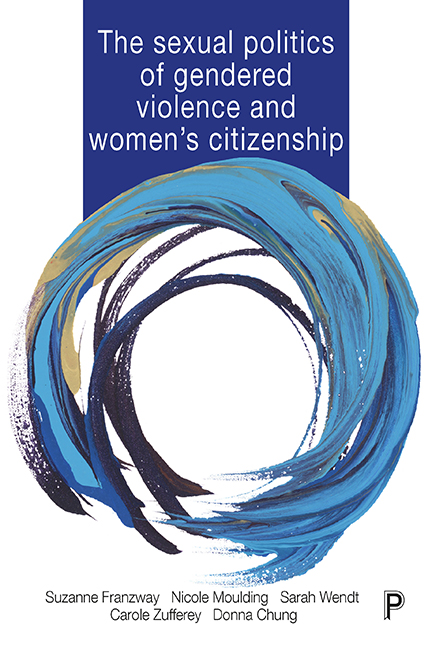Book contents
- Frontmatter
- Contents
- List of tables and figures
- Notes on authors
- Acknowledgements
- one The sexual politics of gendered violence and women’s citizenship
- two Problems of citizenship, violence and gender
- three Challenges of researching gendered violence
- four Living the connected effects of violence
- five Gendered violence and the self
- six Re-engaging lives
- seven Campaigns for women’s freedom from violence
- eight Transforming sexual politics
- References
- Index
four - Living the connected effects of violence
Published online by Cambridge University Press: 13 April 2022
- Frontmatter
- Contents
- List of tables and figures
- Notes on authors
- Acknowledgements
- one The sexual politics of gendered violence and women’s citizenship
- two Problems of citizenship, violence and gender
- three Challenges of researching gendered violence
- four Living the connected effects of violence
- five Gendered violence and the self
- six Re-engaging lives
- seven Campaigns for women’s freedom from violence
- eight Transforming sexual politics
- References
- Index
Summary
Violence is a social phenomenon, not reducible to psychological traits, hormones, emotions, or individual pathology. Violence constitutes a social system, an institutional domain, that is parallel to those of economy, polity, and civil society. When complex inequalities are brought into focus, the range of phenomena visible as violence is extended beyond the traditional focus on war and criminal violence to include non-criminalized forms of inter-personal and group violence. (Walby, 2009: 191)
‘It destroyed my family, career and community; it wreaked havoc on my credit rating and my ability to do the work I’m professionally trained to do. Even more than 10 years since the abuser finally disappeared from our lives, there is really no part of my life that is not still affected.’ (Fran)
Introduction
Much of the public attention on domestic violence goes to the horrors of specific incidents. The more severe incidences such as murder, and physical and sexual assault are criminalised, but not all acts of domestic violence are treated as seriously or attract media attention. More importantly, intimate partner violence (IPV) in all its forms is not contextualised within the broad regimes of gender inequality, which are given no attention in traditional state responses (Walby, 2009). As Sylvia Walby points out , when complex inequalities are brought into focus, our understanding of violence extends beyond war and its already criminalised forms. In this study of the impact of certain forms of gendered violence, we recognise that the complex social circumstances that maintain and reproduce inequalities of gender are critical to our understanding and argument. One means by which we illustrate these complexities of inequality is by drawing attention to the long-lasting and interrelated effects of domestic violence on women and how this compounds existing inequalities for women post separation.
The evidence of substantial and complex inequalities of gender is well-established worldwide, across diverse societies. Although much of the international data relies on the simple binary, women/men, it nevertheless points to decisive evidence of the persistence of such inequality. For example, the Global Gender Gap Index includes over 90% of the world's population from 144 countries. It reports on the gap between women and men on health, education, economic and political indicators.
- Type
- Chapter
- Information
- Publisher: Bristol University PressPrint publication year: 2018



